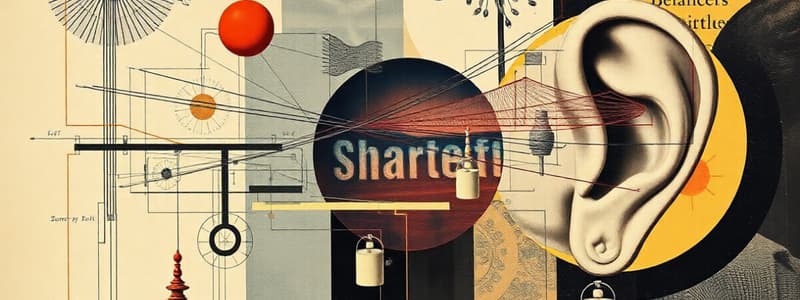Podcast
Questions and Answers
What type of receptors are responsible for both hearing and equilibrium in vertebrates?
What type of receptors are responsible for both hearing and equilibrium in vertebrates?
- Chemoreceptors
- Photoreceptors
- Mechanoreceptors (correct)
- Thermoreceptors
Which part of the ear is primarily responsible for transmitting sound vibrations to the cochlea?
Which part of the ear is primarily responsible for transmitting sound vibrations to the cochlea?
- Tympanic membrane (correct)
- Hair cells
- Auditory nerve
- Cochlea
How is the pitch of sound detected in the cochlea?
How is the pitch of sound detected in the cochlea?
- Intensity of vibrations
- Number of sound waves
- Frequency of nerve impulses
- Position of stimulated hair cells (correct)
What function do hair cells serve in the sensory systems of vertebrates?
What function do hair cells serve in the sensory systems of vertebrates?
Which structure in the ear is responsible for maintaining balance?
Which structure in the ear is responsible for maintaining balance?
What primarily determines the volume of sound detected by the ear?
What primarily determines the volume of sound detected by the ear?
Which element of the ear helps equalize pressure between the middle ear and the atmosphere?
Which element of the ear helps equalize pressure between the middle ear and the atmosphere?
Which type of nerve endings transmit pain signals in the skin?
Which type of nerve endings transmit pain signals in the skin?
What is the primary function of the vomeronasal organ in some vertebrates?
What is the primary function of the vomeronasal organ in some vertebrates?
Which receptors are primarily responsible for the sense of taste?
Which receptors are primarily responsible for the sense of taste?
What do gustatory cells require to detect signals?
What do gustatory cells require to detect signals?
Which of the following structures is involved in the olfactory pathway?
Which of the following structures is involved in the olfactory pathway?
What is the primary purpose of the flehmen response?
What is the primary purpose of the flehmen response?
Which specific taste does not have a unique receptor type among the five recognized tastes?
Which specific taste does not have a unique receptor type among the five recognized tastes?
What distinguishes gustatory cells in humans?
What distinguishes gustatory cells in humans?
Mammals possess over how many different olfactory molecule receptors?
Mammals possess over how many different olfactory molecule receptors?
What role do statolith-containing organs serve in invertebrates?
What role do statolith-containing organs serve in invertebrates?
Which structure is primarily responsible for detecting body movement in the inner ear of vertebrates?
Which structure is primarily responsible for detecting body movement in the inner ear of vertebrates?
How do olfactory cells contribute to the sense of smell?
How do olfactory cells contribute to the sense of smell?
What is the primary function of the lateral line system in aquatic vertebrates?
What is the primary function of the lateral line system in aquatic vertebrates?
Which of the following is NOT a characteristic of chemoreception?
Which of the following is NOT a characteristic of chemoreception?
What type of chemicals are pheromones?
What type of chemicals are pheromones?
Which component in the inner ear helps detect equilibrium in vertebrates?
Which component in the inner ear helps detect equilibrium in vertebrates?
What primary function do the supporting cells in the lateral line system have?
What primary function do the supporting cells in the lateral line system have?
Which structure in vertebrates focuses light on photoreceptors?
Which structure in vertebrates focuses light on photoreceptors?
In which species are well-developed electroreceptors primarily found?
In which species are well-developed electroreceptors primarily found?
What type of vision do compound eyes provide?
What type of vision do compound eyes provide?
Which photoreceptor type is responsible for detecting light in simple eyes like ocelli?
Which photoreceptor type is responsible for detecting light in simple eyes like ocelli?
What characteristic of photoreceptors allows them to respond to light?
What characteristic of photoreceptors allows them to respond to light?
What is the primary function of the electroreceptors found in catfish?
What is the primary function of the electroreceptors found in catfish?
Why is the compound eye's resolution inferior to that of a human eye?
Why is the compound eye's resolution inferior to that of a human eye?
What trait has been lost in terrestrial species among chordates?
What trait has been lost in terrestrial species among chordates?
What happens to rhodopsin in response to light?
What happens to rhodopsin in response to light?
What occurs to Na+ channels when rhodopsin is activated?
What occurs to Na+ channels when rhodopsin is activated?
What type of photoreceptor is primarily sensitive to low light conditions?
What type of photoreceptor is primarily sensitive to low light conditions?
What is the outcome for bipolar cells when no glutamate is released?
What is the outcome for bipolar cells when no glutamate is released?
What role does lateral inhibition play in retinal processing?
What role does lateral inhibition play in retinal processing?
What type of stimuli do cone photoreceptors detect?
What type of stimuli do cone photoreceptors detect?
What is facilitated by the interaction of different neuron types in the retina?
What is facilitated by the interaction of different neuron types in the retina?
What role do free nerve endings play in the context provided?
What role do free nerve endings play in the context provided?
Flashcards
Electroreceptors
Electroreceptors
Specialized sensory cells that detect changes in electrical fields produced by living organisms.
Electroreception
Electroreception
The ability to detect and respond to electrical fields.
Barbels
Barbels
Tiny projections on the mouth and body of some fish, like catfish, that contain taste receptors.
Photoreceptors
Photoreceptors
Signup and view all the flashcards
Cornea
Cornea
Signup and view all the flashcards
Lens
Lens
Signup and view all the flashcards
Retina
Retina
Signup and view all the flashcards
Compound eye
Compound eye
Signup and view all the flashcards
Olfactory Sense
Olfactory Sense
Signup and view all the flashcards
Odorants
Odorants
Signup and view all the flashcards
Olfactory Bulb
Olfactory Bulb
Signup and view all the flashcards
Vomeronasal Organ
Vomeronasal Organ
Signup and view all the flashcards
Flehmen Response
Flehmen Response
Signup and view all the flashcards
Gustation
Gustation
Signup and view all the flashcards
Gustatory Cells
Gustatory Cells
Signup and view all the flashcards
Taste Buds
Taste Buds
Signup and view all the flashcards
Free Nerve Endings
Free Nerve Endings
Signup and view all the flashcards
Hair Cells
Hair Cells
Signup and view all the flashcards
Pinna
Pinna
Signup and view all the flashcards
Tympanic Membrane
Tympanic Membrane
Signup and view all the flashcards
Middle Ear Bones
Middle Ear Bones
Signup and view all the flashcards
Semicircular Canals
Semicircular Canals
Signup and view all the flashcards
Basilar Membrane
Basilar Membrane
Signup and view all the flashcards
Sensory hair cells
Sensory hair cells
Signup and view all the flashcards
Statholiths
Statholiths
Signup and view all the flashcards
Inner ear
Inner ear
Signup and view all the flashcards
Cupula
Cupula
Signup and view all the flashcards
Lateral line system
Lateral line system
Signup and view all the flashcards
Pheromones
Pheromones
Signup and view all the flashcards
Rhodopsin
Rhodopsin
Signup and view all the flashcards
Rod Depolarized
Rod Depolarized
Signup and view all the flashcards
Rod Hyperpolarized
Rod Hyperpolarized
Signup and view all the flashcards
Glutamate
Glutamate
Signup and view all the flashcards
Bipolar Cells
Bipolar Cells
Signup and view all the flashcards
Horizontal Cells
Horizontal Cells
Signup and view all the flashcards
Lateral Inhibition
Lateral Inhibition
Signup and view all the flashcards
Pit Organs
Pit Organs
Signup and view all the flashcards
Study Notes
Sensory Systems
- Sensory systems are crucial for interacting with and perceiving the environment.
- Pain signals are transmitted by free nerve endings responding to thermal and mechanical stimuli, or molecules released by injured cells.
- Hearing and equilibrium perception are linked, both detecting particles or fluid movement via mechanoreceptors in the body.
- Hair cells are mechanoreceptors with mechanically-gated ion channels. These channels open in response to displacement of hair-like projections. Channel opening is due to movement within the cell.
- Vertebrate ears transmit sound vibrations from the tympanic membrane through three middle ear bones to the cochlea.
- Volume sensing in the ear is based on hair cell stimulation number. Pitch is determined by stimulated hair cell position within the cochlea.
- Gravity and position are sensed within invertebrates with statolith-containing organs and vertebrates using inner ear sensors.
- Aquatic vertebrates have lateral line systems to detect water currents and vibrations.
- Chemoreception, the detection of molecules, is the oldest and most universal sense. It's crucial for locating food, mates, avoiding danger, and sensing chemicals. Examples include identifying food, mates, predators, noxious chemicals (like CO₂ and H₂O).
- Olfaction, the sense of smell, relies on olfactory cells (chemoreceptors). These detect airborne volatile/soluble substances.
- Pheromones, chemicals used for communication between members of the same species. Some insects use their antennae to capture pheromone signals from the air.
- Mammals possess a highly developed olfactory system, with thousands of odor molecule receptors.
- Vomeronasal organs, found in the mouths of various vertebrates, detect pheromones. The flehmen response used in this process.
- Gustation (taste) is detected by gustatory cells responding to chemicals present in contact with mouth parts. Substances are food-related and water-soluble.
- Receptor cells in taste buds are specialized to detect one of the five tastes.
- Taste (gustation) receptors aren't always in the mouth; some animals, like catfish, have concentrated receptors on barbels or distributed over the body.
- Electroreception senses electric fields produced by muscle activity in living organisms. This is crucial for prey detection, in sharks.
- Electroreceptors are widely distributed among aquatic chordates, but largely absent in terrestrial species. The platypus has electroreceptors in its bill.
- Photoreception is the detection of light by photoreceptors. These structures alter form in response to electromagnetic waves within a certain range of wavelengths.
- Compound eyes, common in arthropods, are composed of many photoreceptor units. Each has its own cornea and focusing lens to create an image.
- Single-lens eyes in vertebrates focus light onto photoreceptors in the retina.
- Rod photoreceptors are sensitive to low light, while cone photoreceptors are sensitive to different light frequencies, crucial for color vision.
- Interactions between different cells in the retina (e.g., bipolar cells, horizontal cells, amacrine cells) enhance image contrast via lateral inhibition.
- Some vipers have pit organs for detecting infrared radiation which is used for thermal imaging.
Studying That Suits You
Use AI to generate personalized quizzes and flashcards to suit your learning preferences.




